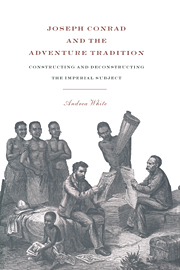Book contents
- Frontmatter
- Contents
- Acknowledgments
- Introduction
- 1 Constructing the imperial subject: nineteenth-century travel writing
- 2 Adventure fiction: a special case
- 3 Them and us: a useful and appealing fiction
- 4 The shift toward subversion: the case of H. Rider Haggard
- 5 Travel writing and adventure fiction as shaping discourses for Conrad
- 6 Almayer's Folly
- 7 An Outcast of the Islands
- 8 The African fictions (I): “An Outpost of Progress”
- 9 The African fictions (II): “Heart of Darkness”
- Coda
- Notes
- Bibliography
- Index
- Frontmatter
- Contents
- Acknowledgments
- Introduction
- 1 Constructing the imperial subject: nineteenth-century travel writing
- 2 Adventure fiction: a special case
- 3 Them and us: a useful and appealing fiction
- 4 The shift toward subversion: the case of H. Rider Haggard
- 5 Travel writing and adventure fiction as shaping discourses for Conrad
- 6 Almayer's Folly
- 7 An Outcast of the Islands
- 8 The African fictions (I): “An Outpost of Progress”
- 9 The African fictions (II): “Heart of Darkness”
- Coda
- Notes
- Bibliography
- Index
Summary
While using the genre of adventure fiction to subvert certain major assumptions of the imperial subject as it had been constructed by the travel writing and the adventure fiction of the day, Conrad certainly did not challenge all of the myths central to that subject, as this study has shown. For example, he never seriously questioned the sexist and racist biases of the discourse. While Watt observes that Conrad subverts a stereotype of the exotic romance – “the notion that woman is the sublimely passive creature of Victorian convention” – in his depiction of, for example, Nina's aggressiveness (Watt, Conrad, p. 46), it is also true that the portrayals construct stereotypes of their own and that Conrad creates few, if any, living women.
Although a few individualized characters emerge from the Malayan fiction – Babalatchi, for one – Conrad's Africans are stereotypically, if sympathetically, depicted. And while Jeffrey Meyers finds that Marlow, and presumably Conrad, “commit[s] himself – emotionally and compassionately – to the Africans he encounters” (p. 60) in “Heart of Darkness,” Achebe's charges of racism have great validity. Achebe contends that in “Heart of Darkness” Conrad depicts the Africans generally as speechless brutes, engaged in “mindless frenzy,” and that he does so mainly in such dehumanized terms as “limbs or rolling eyes,” and that the idea that “they” might claim a distant kinship with “us” repulses both Marlow and Conrad (“An Image of Africa,” pp. 784–785).
- Type
- Chapter
- Information
- Joseph Conrad and the Adventure Tradition , pp. 193 - 203Publisher: Cambridge University PressPrint publication year: 1993



